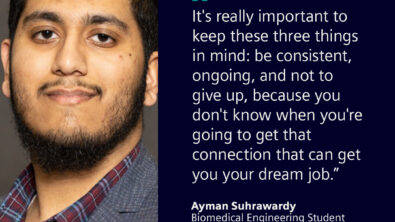Seven essential skills for your mechanical engineering career

A career in mechanical engineering lets you solve practical problems, drive advancements in sustainability and make a global impact.
There’s nothing more satisfying than watching the project you drew in CAD get fabricated. What’s more, mechanical engineers are in-demand.
According to a recent survey from Machine Design, mechanical design was the #1 skill that companies had trouble recruiting for, with 62% of 311 survey participants reporting that it was hard to find engineers with this skill.
But technical skills alone aren’t enough. To thrive, mechanical engineers need a mix of technical and soft (or durable) skills not always covered in school.
Based on industry job descriptions, here are the key aptitudes required for a successful career.
Siemens’ new Expedite — Skills for Industry microcredential is designed to help students gain and verify key skills for today’s engineering workplaces, including durable skills like communication and project management. Learners can enroll now on Coursera or visit our website to learn more.
Demonstrating your skills
Anyone can say they have a skill on their resume, but it’s a lot more powerful if you show employers what you’ve achieved by applying a specific skill.
With this in mind, we’ve included examples of how you might demonstrate each of these skills on your resume or LinkedIn profile.
1) Critical thinking
One of the biggest things that can set an engineer apart is their ability to keep the business case in mind and critically evaluate any decision from that perspective.
Any mechanical engineer can design a part, but the best engineers think critically about every decision in the design process and can explain to their superiors why each decision was made.
How to demonstrate this skill [example]: Diagnosed and resolved a turbine vibration issue, improving system efficiency by 15% through root cause analysis and design adjustments.
2) Creativity
The most effective engineers are always spotting connections that others don’t see, identifying novel opportunities for improvement or brainstorming new designs.
Today’s manufacturers are eager to hire engineers who can think outside-the-box and propose new solutions to existing problems.
How to demonstrate this skill [example]: Led the design of a robotic arm incorporating adaptive grip technology, enhancing flexibility for various manufacturing tasks.
3) Project management
Managing a team of multiple engineers across different disciplines can be incredibly challenging. Someone has to ensure that each member of the team is contributing effectively, coordinating their efforts and keeping them on-track to hit key project deadlines.
By learning and demonstrating this skill, engineers can dramatically accelerate their career advancement.
How to demonstrate this skill [example]: Led a team to design a custom cooling system for high-performance engines.
4) Communication and collaboration
Whether you’re managing the project or working as an individual contributor, communication and collaboration is key. In industry, every project is a group project.
You must be able to clearly explain the challenges you’re facing and the solutions you’re proposing to professionals who may not understand the nuances of mechanical design. And if you can’t sell your ideas, you can’t implement them either.
How to demonstrate this skill [example]: Successfully pitched a design proposal for the incorporation of composite materials for reduced chassis weight.
5) CAD and CAM software skills
Most mechanical engineers will graduate knowing CAD/CAM software. However, it’s key to remember that different companies use different tools and seek candidates familiar with their preferred CAD/CAM software.
Bombardier recently shared that they are specifically seeking graduates who know Siemens NX.
“[Knowledge of NX] is definitely something we are going to seek, because it’s something that would facilitate contributions from engineers starting on day one.”
– Hiring manager with Bombardier
Students can download NX and other software for free on our student software page and can learn these tools with free software training via Siemens Xcelerator Academy.
How to demonstrate this skill [example]: Designed and optimized a high-precision turbine blade using Siemens NX.
6) Adaptability
In today’s day and age, technology – and as a result, the workplace – never stops changing. Successful engineers must continuously learn how to best utilize new technologies and how new trends affect the systems and products they’re working on.
Siemens offers a variety of courses on Coursera to brush up on new skills and improve your resume. From digital transformation to sustainability, these courses allow you to not only amass new skills but earn credentials and certificates to verify and showcase your learnings.
How to demonstrate this skill [example]: Adapted to a last-minute design change by revising CAD models and adjusting manufacturing specifications, meeting the project deadline without increased costs.
7) Technical proficiency
It’s easy to take these skills for granted, but employers value engineers with proficiency in skills like technical drawing, GD&T (geometric dimensioning and tolerancing), structural analysis and finite element analysis.
Practical experience with building components or products yourself can set you apart from other candidates, too. You may also consider finding full or part-time work in a machine shop to learn processes like milling, turning and sheet metal bending.
These hands-on experiences help deepen your understanding of theoretical concepts and improve your ability to problem-solve.
How to demonstrate this skill [example]: Operated CNC milling and turning machines to fabricate precision components, achieving tolerances within ±0.01 mm.
To learn more about how Siemens’ Global Academic and Future Workforce Program supports mechanical engineering students and professionals like yourself, visit our student page.


